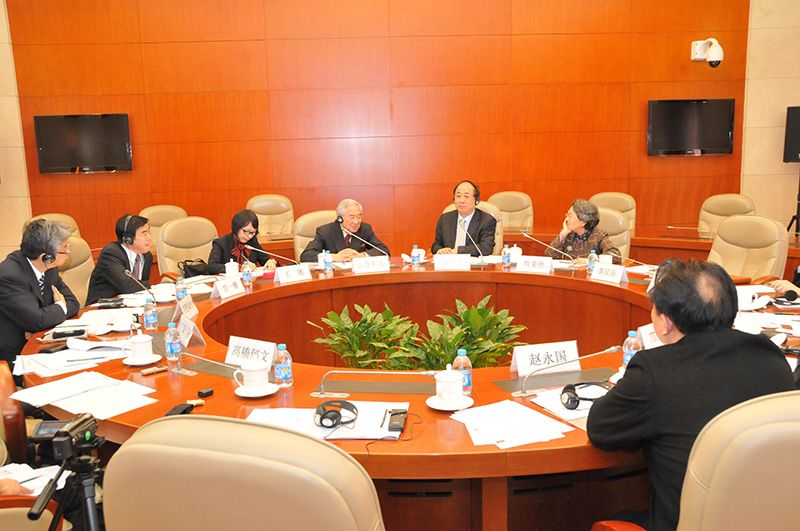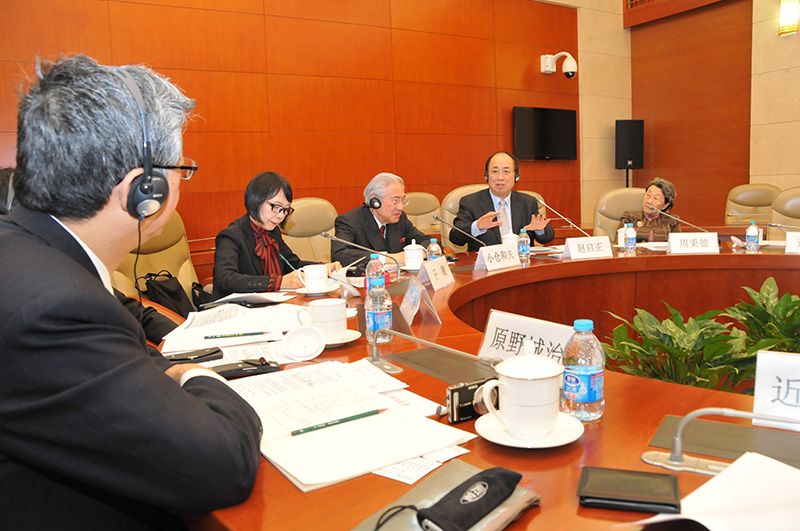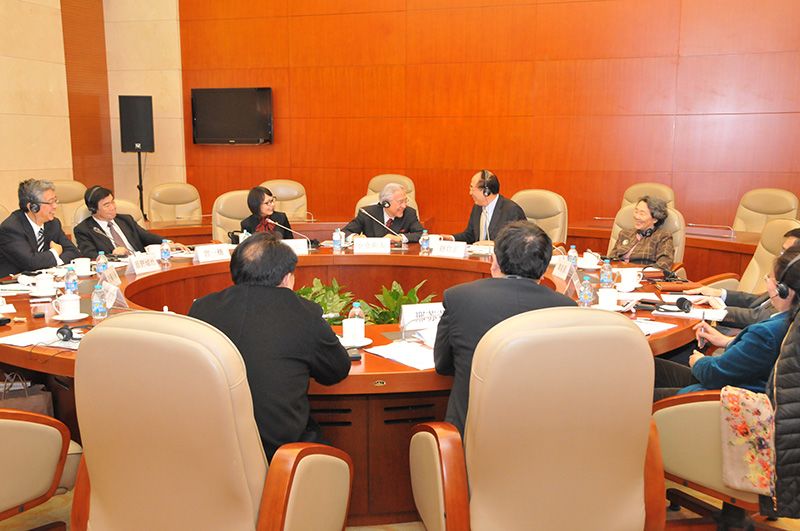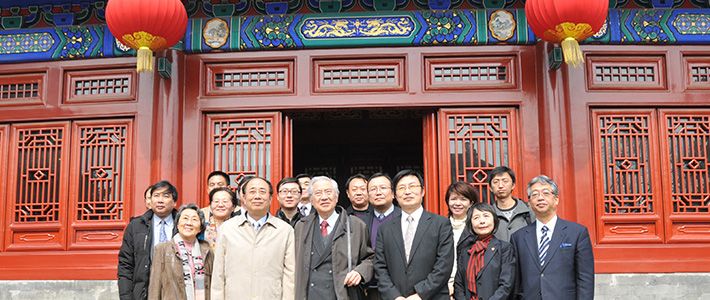
“Dualities” that Impact China-Japan Diplomacy
Politics Society- English
- 日本語
- 简体字
- 繁體字
- Français
- Español
- العربية
- Русский
A joint diplomacy workshop was held on March 14–15, 2012, at the Chinese People’s Institute of Foreign Affairs in Beijing, to discuss foreign policy issues facing Japan and China. The event began with keynote addresses delivered by Ogoura Kazuo, former president of the Japan Foundation, and Zhao Qizheng, Chairman of the Foreign Affairs Committee of the Chinese People’s Political Consultative Conference; followed by a lively discussion on underlying “dualities” within the two countries.
Ogoura pointed out that China has the duality of being both a permanent member of the United Nations Security Council and a country still undergoing development; while Japan faces problems related to its difficulty in confronting historical issues that cannot be simply swept under the carpet. Ogoura noted that Japan’s approach to its wartime history remains vague, particularly compared to the stance of Germany, and he called for further discussions with China encompassing this issue.
Recognizing China’s position as both a major economic power and a developing nation, Zhao said that the government is cognizant of public frustration and criticism aimed at it, and is responding in a prudent manner while taking into account public opinion and the demands of the international community. Zhao compared the relationship of China and Japan to a bonsai tree, in that it should be given neither too much nor too little water. Seeing a need for enhanced mutual understanding between the two countries, he emphasized the need for both sides to take a measured approach to fostering their relationship.
The discussion that took place at the workshop is summarized in more detail below.
Ogoura: China as a Permanent Security Council Member and Developing Country
China is both a world power and a permanent member of the UN Security Council, Ogoura pointed out, but in some respects it is not entirely outside the realm of the Third World and developing nations. This poses a dilemma, as he explained:
“Permanent members of the Security Council have the basic responsibility of maintaining order around the world; however, developing countries are often dissatisfied with, and call for reforms of, the current global economic and political order created by developed nations. China is the only country in the world with a foot in both camps.”
Ogoura went on to raise the question of how China is working to balance the two positions, and what its public diplomacy entails today.
Zhao: China Conflicted as It Faces Demands from Developing Countries
Zhao agreed with the way Ogoura characterized China’s dilemma, while noting that resolving this situation is difficult. He elaborated on the duality of China’s position today:
“China has the world’s largest population and land mass, and its second-largest GDP. It is also a political superpower in its role as a permanent member of the UN Security Council. Yet, in terms of per-capita GDP, it is on par with Zimbabwe, not even ranking in the top 100.
“China once had many friends in the Third World, connected in a way by poverty, but now developing countries believe that as it becomes richer, China no longer serves their interests, and that it should follow the example of Japan in providing them with foreign aid. While they have near identical GDPs, Japan has only one tenth the population of China, making it a much richer country.
“Doubts remain in China over whether, as a developing country, it should play a role in international aid. Many wonder why it should have to help the rest of the world when it is poor itself. However, developed countries view China as having already emerged, and would like to see it take on a more active international role. The international community is beginning to call on China to do this through such means as contributing more to the United Nations.
“China faces similar demands in the area of climate change. The country is being asked to pay compensation for the large amount of CO2 it is generating. While the United States and Europe have been producing carbon emissions for the past 100 years, China has only just started to. While we talk about disparate responsibilities, the international community finds itself torn between the conflicting demands of developed and emerging nations. China may be slow to react to the climate change demands placed on it, due to various considerations.”
The Military Buildup Noted by Kissinger
Zhao next touched on his experience of participating recently in the US-China Track II talks with former Secretary of State Henry Kissinger: “Kissinger noted that China’s military spending was rising each year, at a double-digit rate. He observed that, while China spoke of peaceful development, it was clearly enhancing its military. But Zhao noted that China’s military spending doesn’t begin to approach that of the United States:
“China’s military budget is currently around one tenth that of the United States. But the United States believes that China’s lack of transparency may mean the real number is much larger. Even if it were, Chinese military spending still would not be likely to come close to US spending—although it might be equal to Japanese military spending, which would be to great cause of concern for Japan.”
One key difference between the United States and China that Zhao pointed out is that China borders 14 countries by land, and 15 by sea. It thus faces a range of different political and military powers, and, if India, Pakistan, and North Korea are included, a handful of nuclear powers as well. The situation is extremely complicated.
“China has a land border of more than 10,000 kilometers, and its maritime border is even longer, presenting a far more complex situation than that facing Japan. China has to confront nearby al-Qaeda bases, drug smuggling organizations, and various other challenges in Northeast Asia. At the same time, it must also cover the cost of modernizing its military equipment and increasing pay for its soldiers.”
Chinese Citizens Are Dissatisfied with and Critical of Their Government
In his comments, Zhao touched on a number of other issues related to present-day China, including its leading role in the global apparel industry, which is one of the country’s chief export industries:
“The apparel companies of developed countries must now offshore production to China, or face bankruptcy, but this can result in a hollowing out of their own domestic apparel industry—and complaints related to this fact are being voiced in the developing world. In this sense, China again finds itself caught in a dilemma where the low prices of the products it produces can cause it to lose business opportunities among those developing countries.”
Zhao noted how Chinese citizens are voicing their dissatisfaction and criticism of the government. “Some wonder why the Chinese government does not act in a bolder fashion, like Russia; others would prefer for it to engage in “value-oriented diplomacy,” like Japan; and then there are those who are calling for it to take a hard-line approach toward Japan. The Chinese government must act prudently, taking into account both international demands and domestic public opinion.”
The German ambassador to China told Zhao that, while China claims to be a developing country, he has trouble believing that is the case. But Zhao, for his part, describes China as “having only two suits—Shanghai and Beijing”—showcased in Expo 2010 and the 2008 Beijing Olympics, respectively. He added: “What China shows to the world is only these topcoats, but there is nothing of substance inside. If you travel inland, many of the defects concealed by those garments become apparent.”
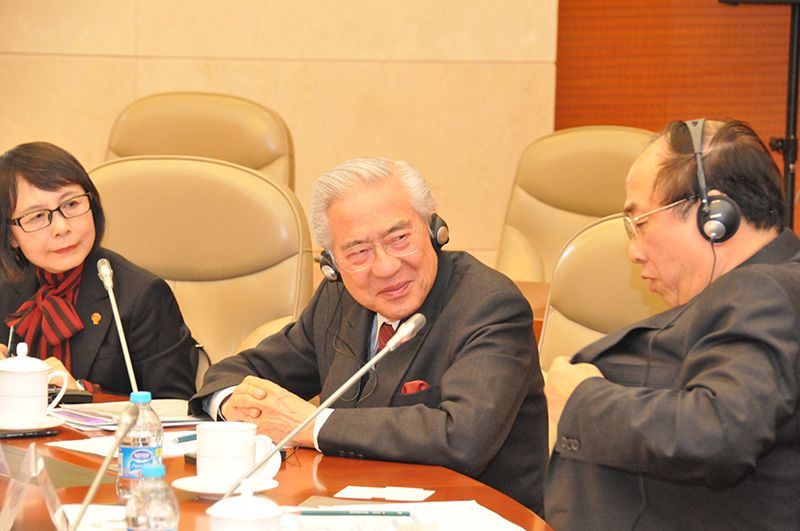 From left to right: Wang Min, Ogoura Kazuo, Zhao Qizheng
From left to right: Wang Min, Ogoura Kazuo, Zhao Qizheng
Chinese-Japanese Relations Like a Bonsai Tree
”Chinese intellectuals on the whole hold a favorable view of Japan,” Zhao observed, “while the general populace does not.” Academia and the political world in China both believe in the importance of China-Japan relations, he explained, but during a live interview in Tokyo with political commentator Tahara Sōichirō, Zhao was asked if it wasn’t in fact the case that the existence of problems between China and Japan is the reason why he is always underscoring the importance of bilateral friendship. While Zhao did not go so far as to agree with Tahara’s observation, it did make him realize that there is much more talk in China of friendship with Japan than with the United States or Europe. Zhao also noted how callous comments by politicians can harm relations between the two countries:
“Take, for example, the statement made in 2012 by Kawamura Takashi, the mayor of Nagoya, expressing skepticism about the Nanking Massacre. One might quibble with the exact figures of the scale of the tragedy—whether 300,000 or 200,000 people were killed—but the fact a massacre occurred is undeniable. Despite that incident, though, China treated the Japanese children orphaned in China after World War II extremely well. Unfortunately, Japanese politicians continue to make such outrageous remarks, without considering the overall stance of the Japanese government—and bilateral relations suffer as a result. I believe that the relations between China and Japan are like a bonsai tree: they can be given neither too little, nor too much water.”
Zhao expressed his view that China’s relationship with the United States is more resilient than its relationship with Japan, for historical reasons: “I think it is natural for China to be upset with Japan, given the Chinese citizens it slaughtered before and during World War II, but the Chinese need to have a better understanding of the frustrations the Japanese might have with China today. This is another task confronting Chinese public diplomacy.”
Ogoura: Japan Lacks a “Vertical” Approach to History
Following Zhao’s comments, Ogoura noted that China is on the verge of profound historical change:
“Mr. Zhao has used the term ’duality’ to describe the change China is now undergoing, and this is a concept that Japan also needs to understand. The current generation of Japanese sees everything as two-sided: Japan and China; Japan and the United States; Japan and South Korea. It lacks a more “vertical” way of thinking and approach to history. This has always been an enormous problem for Japanese. They don’t look at Japan’s position throughout history. The Internet makes information ubiquitous, but one of its main failings is that it offers only current information—not past experience.”
He contrasted that Japanese tendency with the way China looks at nearly everything through the wide lens of history:
The concept of ”historical awareness’ does not really exist in Japan. The words themselves exist, but they are not ones the Japanese regularly use. While intellectuals may consider Japan as part of the broad course of history, the current generation of Japanese citizens does not. This is an outcome of the experience of World War II. The Chinese, in contrast, are aware of their country’s place in history. As for why Japanese politicians continue to make statements regarding China that lack both understanding and this type of proper historical awareness, I think it is related to how Japan today is extremely disinclined to consider anything in a historical context.”
China Can Easily Break With Its Past—Japan Cannot
“As the Japanese start to interact more and more with the Chinese,” Ogoura noted, “what is important is not the rights and wrongs of the past, but that people in Japan learn to see things as a part of history.” He elaborated on this point:
“Dynasties change in China. When they do, the political system undergoes a drastic transformation, resulting in new ways of thinking that break with the past. China can easily say that the Qing Dynasty was wrong and the revolution was right. But in Japan’s case, its imperial system has existed for close to 1,500 years. The Kamakura shogunate and Tokugawa shogunate came and went, but the imperial system remained as a symbol of Japan during all those centuries. Because of this, Japan has difficulty making a break with its past.”
Ogoura noted the paramount of importance in China of making that break with the past in order for a new dynasty to be born; and that Japan has never been able to fully put the past behind it. “This is where Japan runs into a different problem of ‘duality’ than China,” he explained, “in terms of the dynamic between ‘continuity and reform’ and ‘change and continuity.’ This makes Japan’s historical awareness extremely complicated.”
Ogoura stressed that mutual understanding between China and Japan will require both sides to understand each other’s internal dualities.
The Difference Between Post-War Germany and Japan
Ogoura concluded his comments by relating the important—but often overlooked—story of how Japan’s surrender to the Allies at the end of World War II differed from Germany’s surrender.
“Germany is often compared to Japan, but its government did not in fact sign the instrument of surrender because the Allies did not officially recognize the Nazi government. Rather, it was the German military that signed the document. Hitler’s Third Reich was completely destroyed in World War II. This meant that, legally speaking, the new post-war Germany bore no relation to the old Nazi government. This is why Germany has been better able to reckon with its past.
“In Japan’s case, however, both the Japanese military and Japanese government signed the instrument of surrender. This meant that the Allies recognized the existence of the Japanese government. The Japanese state had not collapsed, so there was a continuity. This is a fundamental difference between Germany and Japan, and a reason why Japanese government even today has not broken with its past.
“Just as China today struggles with its duality, Japan struggles with the tension between continuity and change. Surrender on August 15, 1945, did not result in the dissolution and discontinuation of the Japanese state. This is why the issue of wartime responsibility continues to be so nebulous. Does the Japanese emperor bear full responsibility for the war? Or was it the handful of militarists within the Japanese army who were to blame? To what extent were civilians within the military-industrial complex at fault? Many unresolved questions remain.
“As a result of this ambiguity, we see that different people are making different remarks in different places. While historical continuity is important, it is also extremely important to take a sharp look at the past and own up to past mistakes. Bilateral dialogue which includes this type of past reconciliation is critical to China-Japan relations.
Huang Xingyuan, Vice President of the Chinese People’s Institute of Foreign Affairs
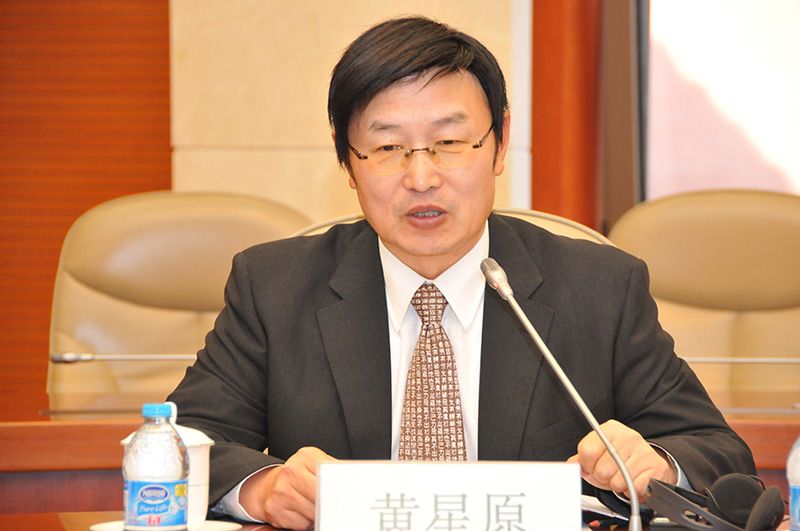 The vice president of the Chinese People’s Institute of Foreign Affairs, Huang Xingyuan, also addressed the workshop. He began by noting that on March 15, 2012, the Chinese government appointed Tang Jiaxuan, the former foreign minister, to be the chairman of the China-Japan Friendship Association. Xingyuan interpreted this as a sign that the Chinese government views relations with Japan as an extremely important issue. He then went on to touch on two salient issues now confronting the relations between Japan and China.
The vice president of the Chinese People’s Institute of Foreign Affairs, Huang Xingyuan, also addressed the workshop. He began by noting that on March 15, 2012, the Chinese government appointed Tang Jiaxuan, the former foreign minister, to be the chairman of the China-Japan Friendship Association. Xingyuan interpreted this as a sign that the Chinese government views relations with Japan as an extremely important issue. He then went on to touch on two salient issues now confronting the relations between Japan and China.
“The first key issue concerns historical awareness, and this problem is not likely to change. The other issue concerns territorial disputes. And, unfortunately, this problem, too, is immutable. There are a handful of people with questionable motives who are seeking to sabotage relations between China and Japan, and the two countries now find themselves caught in a vicious circle. But there are two aspects we can focus on in seeking to improve relations. The first is the channel of official diplomacy. This is the most important aspect of the solution. It is connected to how the China-Japan relationship fits into the global strategy of each, and also related to how diplomatic activities are positioned within that strategy. Once the overall diplomatic direction of each country is determined, the smaller pieces will fall into place. All of these factors concern the role of government. But there is a second important aspect, related to public diplomacy. I think that role of public diplomacy is to step in when bilateral trust has been damaged, and friendly ties between citizens of both countries have been weakened, in order to help strengthen these relations.”
Remarks from Former CPPCC Member Zhou Bingde
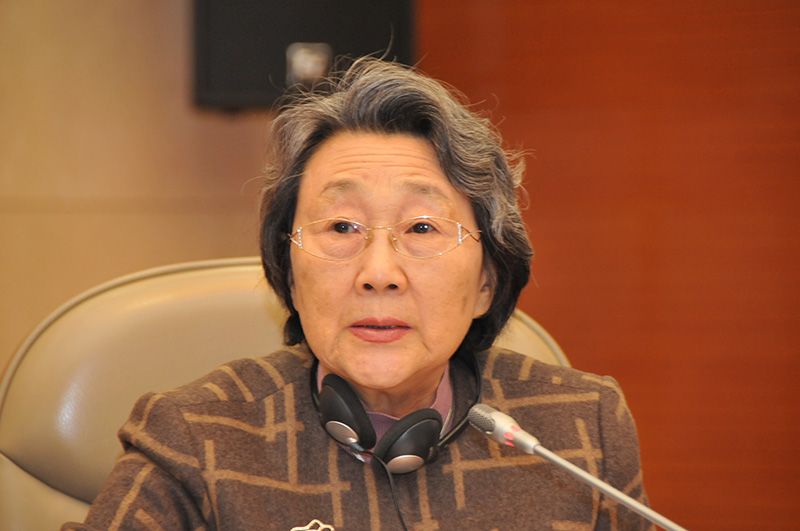 In her comments at the workshop, Zhou Bingde, former member of the Chinese People’s Political Consultative Conference, began by expressing her agreement with Zhao’s observation that Chinese intellectuals generally hold a favorable view of the Japanese, whereas ordinary Chinese citizens do not—as she explained:
In her comments at the workshop, Zhou Bingde, former member of the Chinese People’s Political Consultative Conference, began by expressing her agreement with Zhao’s observation that Chinese intellectuals generally hold a favorable view of the Japanese, whereas ordinary Chinese citizens do not—as she explained:
“The anonymity provided by the Internet allows many young people to make outlandish, irresponsible comments. However, many of these young people have also heard stories from those who experienced the fourteen years of war between Japan and China, and this has likely intensified their emotions. I have often wondered why Japanese political leaders have not expressed their regrets for the past in the manner of German Prime Ministers who have offered their condolences before the gravestones of those who lost their lives in the war. The impressions of China’s young people toward Japan would surely be different if Japan took similar actions. Instead, we see the visits of Japanese government officials to the Yasukuni Shrine and problems with Japanese textbooks’ treatments of the country’s wartime past. Despite this, I still believe friendly relations between China and Japan are essential, and would like to see both sides move in that direction. Empathy is cultivated through sharing, and both countries must take a step toward friendship.”
diplomacy politics Ogoura Kazuo Society Chinese-Japanese Relations Zhao Qizeng
